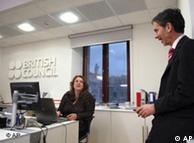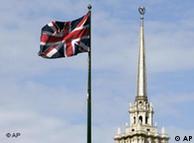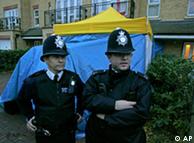International Relations | 14.01.2008 /d.welle
Anglo-Russian Relations Worsen Over British Council Row
British-Russian relations soured again on Monday, Jan. 14., after the Russian government announced sanctions against the British Council for reopening two regional offices in defiance of a ban.
Russia responded angrily on Monday to the re-opening of two British Council (the cultural arm of the British Foreign Office) offices in the country. The re-opening of the offices in St. Petersburg and Yekaterinburg came in defiance of a Russian Foreign Ministry order that regional branches of the British Council shut their doors from the start of 2008.
In a statement, the Russian Foreign Ministry said the decision to reopen the cultural centers in Saint Petersburg and Yekaterinburg had been a "premeditated provocation." It added that "legal pressure" -- including a ban on visas for employees of the British Council would be applied.
Further measures would include tax inquiries against the British Council in Saint Petersburg, a visa ban on new council employees in St. Petersburg or Yekaterinburg and a block on accreditations for existing employees.
 Bildunterschrift: Großansicht des Bildes mit der Bildunterschrift: The Council's St. Petersburg office remains open
Bildunterschrift: Großansicht des Bildes mit der Bildunterschrift: The Council's St. Petersburg office remains open
Moscow said the ban on the regional offices -- which does not extend to the British Council's main center in Moscow -- was in response to Britain's expulsion of four Russian diplomats in 2007.
If the council continues to defy a ban, the Russian Foreign Ministry said on its Web site that it "retained the right to adopt additional measures, including against the British Council office in Moscow."
UK refuses to back down
British Prime Minister Gordon Brown has however maintained that the British Council is "fully entitled" to operate in Russia and that it will continue to operate in Russia despite the government's latest warnings.
British Ambassador Anthony Brenton said in a statement after he was summoned to the Russian Foreign Ministry on Monday that any Russian action against the British Council "would be a breach of international law."
 Bildunterschrift: Großansicht des Bildes mit der Bildunterschrift: Britain's ambassador refuses to back down
Bildunterschrift: Großansicht des Bildes mit der Bildunterschrift: Britain's ambassador refuses to back down
Employees of the British Council working in Russia maintain that they are operating legally in Russia and said in a statement on their Web site that they have "no plans to close our centers."
"The British Council wants to continue its work in Russia and St. Petersburg," said the head of the St. Petersburg branch, Stephen Kinnock told the AFP news agency. "We hope we'll find a solution to this.
"The British Council is a non-political independent organization," he added. "We work in the areas of culture and education.... It's really disappointing that we've been dragged into what is essentially a political matter."
The Council's Chief Executive, Martin Davidson, reaffirmed that the Council's Russian offices would remain open.
"We are committed to working in Russia and we intend to remain open as long as there is demand for our services," said Davidson in a statement on the Council's Web site.
The Council states that in 2006/07, 485,000 Russians took part in British Council projects or visited exhibitions, plays, films organized by the British Council.
Russia says Council without legal foundation
However Russia has stressed that the British Council operations in the country have no legal foundation. It claims that the development of a bi-lateral agreement between Russia and the UK was frozen following the expulsion of Russian diplomats last year.
In a statement on the Russian Foreign Ministry Web site, spokesperson Mikhail Kamynin asked: "What would our partner's reaction be if we, without the consent of the host country and without any legal foundations were arbitrarily opening our cultural centers, vesting them with diplomatic status and placing them above the national laws of the host country?"
The statement, dated Jan. 3, also alleges that the British Council Offices in St. Petersburg and Yekaterinburg violate the 1963 Vienna Convention on Consular Relations.
Russia has also accused the British Council of operating outside its official status and of violating tax regulations, charges the Council denies.
Relations could worsen
 Bildunterschrift: Großansicht des Bildes mit der Bildunterschrift: The death of Litvinenko sparked the stand-off
Bildunterschrift: Großansicht des Bildes mit der Bildunterschrift: The death of Litvinenko sparked the stand-off
The latest diplomatic dispute between Russia and the UK is likely to heighten tension between the two countries.
The Russian Foreign Ministry's has said that "Russia views such actions as an intentional provocation aimed at inflaming tensions in Russian-British relations."
Ties between London and Moscow have been at a post-Cold War low since the 2006 poisoning death in the UK of former Russian security agent Alexander Litvinenko.
The latest in a series of disputes has heightened tension between the two countries following the tit-for-tat expulsions of diplomats in 2007 prompted by Russia's refusal to extradite a murder suspect, Andrei Lugovoi, to Britain in relation to Litvinenko's death.
In the meantime the British Council has said that despite the political chill they are committed to keeping the "channels of cultural exchange open between Russia and the UK."

Comments